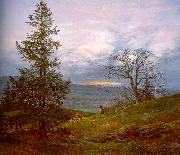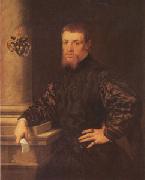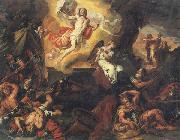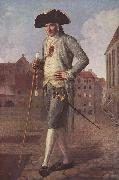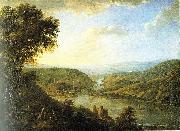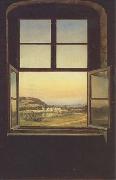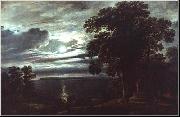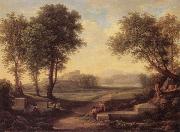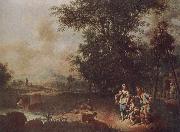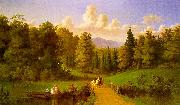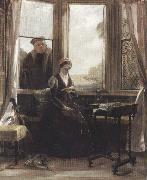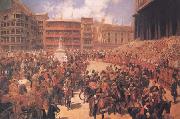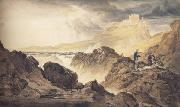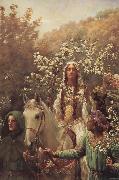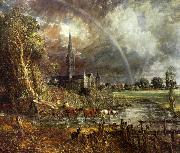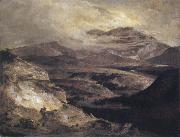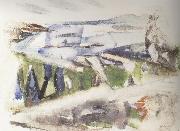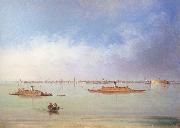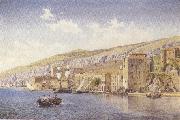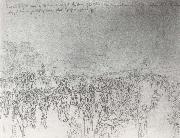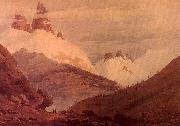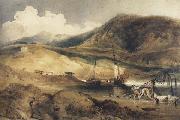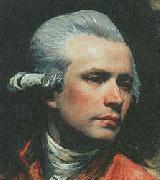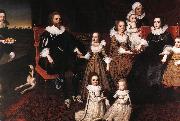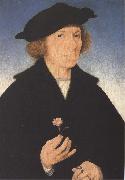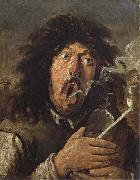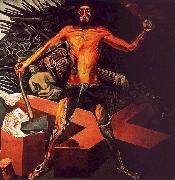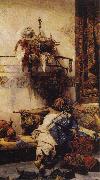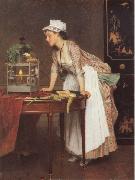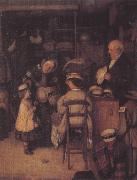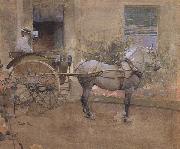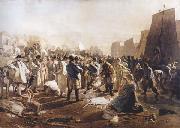|
|
|
|
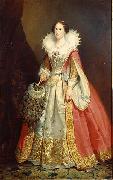 |
Johan Christoffer Boklund
|
|
(15 July 1817 - 9 December 1880) was a Swedish history, genre, and portrait painter from Kulla-Gunnarstorp in Scania.He was the son of a gardener. At the age of fifteen, Boklund came to Lund, where he worked on illustrations for Sven Nilsson's works on Scandinavian fauna (under the supervision of Magnus Körner). He then became a student at the Royal Danish Academy of Fine Arts in Copenhagen where J. L. Lund was his teacher.
In 1837, Boklund went to Stockholm and began studying at the Royal Swedish Academy of Arts. He made a living as a lithograph and drawing teacher, and produced several small genre paintings of the everyday life (such as Flicka med blomster (English: Girl with flowers) and Köksinteriör (English: Kitchen interior)) and history paintings of the 17th century (such as Gustaf Adolfs afsked från Maria Eleonora (English: Gustaf Adolf's farewell from Maria Eleonora), which was awarded with a medal at the academy).
Together with fellow Swedish painter Johan Fredrik Höckert, Boklund traveled to Munich in Germany in 1846 and stayed there for eight years. During the summers he went on study trips to Bavaria, Tyrol, and northern Italy. During this period, Boklund primarily devoted his painting to the history genre with subjects from the 17th century, but he also made some paintings depicting picturesque and architectural interior. In 1853, he sent his painting Den nyfikne trumpetaren (English: The curious trumpet player) home to Sweden and it earned him a scholarship from the government. This allowed Boklund to move to Paris, where he worked at Thomas Couture's atelier from 1854 to 1855. In December 1855 he returned to Sweden. |
|
|
|
|
|
|
|
|
|
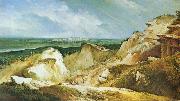 |
Johann Christian Brand
|
|
(March 6, 1722 ?C June 12, 1795)was an Austrian painter (son of the German painter Christian Hilfgott Brand (1694-1756) who taught in Vienna with Karl Aigen) and brother of Friedrich August Brand.Johann Christian Brand influenced ending the baroque era of landscape painting. He died in Vienna.
Johann Christian Brand was born in Vienna on March 6, 1722. Influential in ending the baroque era, Johann studied at the Vienna Academy from 1736.He was awarded with the titles Kammermaler* in 1766 and "Professor of Landscape Drawing" in 1772. |
|
|
|
|
|
|
|
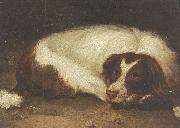 |
Johann Christoph Rincklake
|
|
Johann Christoph Rincklake (1764-1813).
Date of birth and death 19 October 1764(1764-10-19) and 19 June 1813(1813-06-19) .
Location of birth and death, Harsewinkel and Munster. |
|
|
|
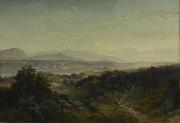 |
Johann Hermann Carmiencke
|
|
Johann Hermann Carmiencke, a landscape painter and etcher, was born at Hamburg in 1810. He went to Dresden in 1831 as a journeyman painter, and while there studied in Dahl's school. Thence he went to Copenhagen in 1834, where he studied in the Academy, and presently repairing to Leipsic, received instruction there from Sohonberg. Returning to Copenhagen in 1838, he proceeded to travel as an artist in Sweden, Bavaria, and the Tyrol, visiting Italy from 1845 to 1846. He was then appointed court painter to Christian VIII, for whom he executed many works. In consequence of the war, he went in 1851 to New York, where he was well received, and admitted into the Academy of Brooklyn. His works were mainly groups of mountain ranges, which were very effectively rendered, and possessed an excellent tone the execution being simple and true to nature. The 'Mountain Tarn' and the 'View on the Zillerthal' may be particularly noticed. There are thirty-five careful etchings of landscapes by him, some of which were published by the Art Association of Copenhagen in 1850 and 1851. He died at New York in 1867. |
|
|
|
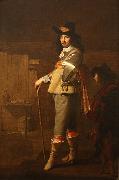 |
Johannes Cornelisz Verspronck
|
|
(between 1600 and 1603, Haarlem - buried June 30, 1662, Haarlem) was a gifted Dutch Golden Age portraitist.
He was the son of the painter Cornelis Engelsz from Gouda, who taught him to paint portraits. In 1632 he became a member of the Haarlem Guild of St. Luke and started a successful career as a portraitist of mostly Catholic sitters in Haarlem. He may have been a Frans Hals pupil, and was strongly influenced by him, especially in his natural expressions and relaxed poses. He is best known for his exactness in painting details such as jewelry and lace, which made him quite popular with female sitters. Most notably, he won a lucrative commission in 1642 for a group portrait of the regentesses of the St. Elisabeth Gasthuis, at the time the wealthiest charity institution in Haarlem. This was won at the expense of Frans Hals himself, who had painted the regents of the St. Elisabeth Gasthuis in 1641 and fully expected to win the commission for the women. |
|
|
|
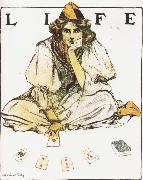 |
John Cecil Clay
|
|
Illustrator and genre, caricature painter
American
1875-1930
|
|
|
|
|
|
|
|
 |
John Cleveley
|
|
circa 1712?C77 English painter, born in Southwark, London. Cleveley did not come from an artistic background |
|
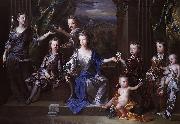 |
John Closterman
|
|
John Closterman (1660-1711) (also spelled Cloosterman, Klosterman), portrait-painter, born in Osnabruck, the son of an artist, who taught him the rudiments of design.
In 1679 he went to Paris, accompanied by his countryman Tiburen, and there worked under Francois de Troy. In 1681 he came to England, and painted draperies for John Riley, at whose death, in 1691, Closterman finished several of his portraits. This recommended him to the Duke of Somerset, but he lost his favour on account of a dispute about a picture of Guercino, specially acquired for his grace, and which was afterwards purchased by Lord Halifax. In 1696 he was invited to the court of Spain, and executed the portraits of the king and queen; he also went to Italy twice, and made several acquisitions of works of art. On returning to England he obtained considerable employment, and married an Englishwoman. He buried his wife, Hannah, on 27 January 1702. According to Arnold Houbraken, he later took a mistress, who then ruined him by her extravagant habits, and ultimately left him in a state of dejection of body and mind that led to his ultimate decline. Jacob Campo Weyerman, who took much of his biographical material from Houbraken, states "Closterman had taken a beautiful mistress who, while he was away in the country, robbed him of his valuables and disappeared, actions which drove the painter into madness".
He died in 1711, and was buried in Covent Garden churchyard. |
|
|
|
|
|
|
|
|
|
|
|
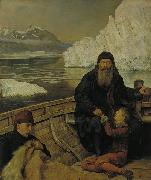 |
John Maler Collier
|
|
(27 January 1850 - 11 April 1934), called 'Jack' by his family and friends, was a leading English artist, and an author. He painted in the Pre-Raphaelite style, and was one of the most prominent portrait painters of his generation. Both his marriages were to daughters of Thomas Henry Huxley. He studied painting at the Munich Academy where he enrolled on 14 April 1875 (Register: 3145) at the age of 25.
Collier was from a talented and successful family. His grandfather, John Collier, was a Quaker merchant who became a Member of Parliament. His father (who was a Member of Parliament, Attorney General and, for many years, a full-time judge of the Privy Council) was created the first Lord Monkswell. He was also a member of the Royal Society of British Artists. John Collier's elder brother, the second Lord Monkswell, was Under-Secretary of State for War and Chairman of the London County Council.
Collier's first wife, Marian Huxley, 1883In due course, Collier became an integral part of the family of Thomas Henry Huxley PC, sometime President of the Royal Society. Collier married two of Huxley's daughters and was "on terms of intimate friendship" with his son, the writer Leonard Huxley. Collier's first wife, in 1879, was Marian (Mady) Huxley. She was a painter who studied, like her husband, at the Slade and exhibited at the Royal Academy and elsewhere. After the birth of their only child, a daughter, she suffered severe post-natal depression and was taken to Paris for treatment where, however, she contracted pneumonia and died in 1887.
In 1889 Collier married Mady's younger sister Ethel Huxley. Until the Deceased Wife's Sister's Marriage Act 1907 such a marriage was not possible in England, so the ceremony took place in Norway. Collier's daughter by his first marriage, Joyce, was a portrait miniaturist, and a member of the Royal Society of Miniature Painters. By his second wife he had a daughter and a son, Sir Laurence Collier KCMG, who was the British Ambassador to Norway 1941-51.
|
|
|
|
|
|
|
|
|
|
|
|
|
|
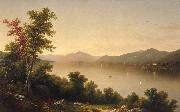 |
John William Casilear
|
|
(June 25, 1811 - August 17, 1893) was an American landscape artist belonging to the Hudson River School.
Casilear was born in New York City. His first professional training was under prominent New York engraver Peter Maverick in the 1820s, then with Asher Durand, himself an engraver at the time. Casilear and Durand became friends, and both worked as engravers in New York through the 1830s.
By the middle 1830s Durand had become interested in landscape painting through his friendship with Thomas Cole. Durand, in turn, drew Casilear's attention to painting. By 1840 Casilear's interest in art was sufficiently strong to accompany Durand, John Frederick Kensett, and artist Thomas P. Rossiter on a European trip during which they sketched scenes, visited art museums, and fostered their interest in painting.
Casilear gradually developed his talent in landscape art, painting in the style that was later to become known as the Hudson River School. By the middle 1850s he had entirely ceased his engraving career in favor of painting full-time. He was elected a full member of the National Academy of Design in 1851, having been an associate member since 1831, and exhibited his works there for over fifty years.
Casilear died in Saratoga Springs, New York in 1893. |
|
|
|
|
|
|
|
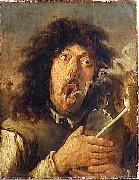 |
Joos van Craesbeeck
|
|
(c. 1605/06- c. 1660) was a Flemish painter who specialized in tavern interiors, tronies, and other works similar to his teacher Adriaen Brouwer. Born in Neerlinter (Flemish Brabant), he became a master in Antwerp's guild of St. Luke in 1633 - 1634, and like his contemporaries David Teniers the Elder and David Rijckaert III he developed rustic genre scenes. He subsequently moved to Brussels, where he joined that city's painters' guild in 1651.
Paintings such as Death is Violent and Fast are typical of his small, theatrical images of peasants brawling crowded with violent expressive figures. Unlike Teniers, whose style became more elegant, Craesbeeck continued to paint bawdy figures later in his career.
|
|
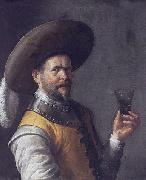 |
Joost Cornelisz Droochsloot
|
|
(1586, Utrecht (city) - May 14, 1666, Utrecht (city)), was a Dutch Golden Age painter.
According to Houbraken his village scenes (Boerekermisstuk) were as popular as flower pieces by Bartholomeus Assteyn.Houbraken thought he was born in Gorinchem or Dordrecht, and claimed he worked for a long time in Dordrecht. He felt his work was always according to a set pattern, where cake sellers were portrayed in front of village houses with figures in a festive setting called a "farmer's circus". It is unclear why Houbraken would have thought he was from Dordrecht, especially since Houbraken's data on painters from Dordrecht was generally quite accurate. Droochsloot and his son were highly respected citizens of Utrecht with a large workshop.
According to the RKD his monogram was "JCODS" and he became a member of the Utrecht Guild of Saint Luke in 1616. He later became deacon of the guild in 1623 and regent of the St. Jobs Gasthuis in 1638, deacon of the Dutch Reformed church, and in 1665 officer of the Utrecht schutterij. He was the father of the painter Cornelis Droochsloot (1630-1673) whose paintings are hard to distinguish from his own, and the teacher of Jacob Duck. |
|
|
|
|
|
|
|
|
|
|
|
|
|
|
|
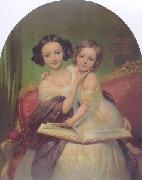 |
Joseph-Desire Court
|
|
a painter of historical subjects and portraits, was born at Rouen in 1797. He became a pupil at the École des Beaux-Arts under Gros, and after carrying off the principal honours there pursued his studies still further at Rome. High expectations were formed of him when he exhibited in 1827 'The Death of Caesar,' a work manifesting earnest thought, and a conscientious handling of the facts of history. This is now preserved in the Louvre. Having shown himself in this and other works a vigorous painter, capable of seizing a subject with a masterly grasp, and having also in the region of portrait painting proved himself an artist of no common merit, he eventually dissipated his talents in the production of a series of empty official pictures painted by order of Louis Philippe. He died in Paris in 1865. The Bordeaux Museum has a portrait of Henri Fonfrede by him; that of Lyons, a 'Scene in the Deluge'; that of Rouen, |
|
|
|
|
|
Jozef Chełmonski
|
|
(November 7, 1849 - April 6, 1914) was a Polish painter.
Chełmoski was born in the village of Boczki near Łowicz in central Congress Poland, Russian Empire. His first drawing teacher was his father (a small leaseholder and administrator of Boczki village). After finishing high school in Warsaw, he studied in Warsaw Drawing Class (1867-1871) and took private lessons from Wojciech Gerson. From 1871 to 1874 Chełmoski lived in Munich. He worked with Polish painters assembled around Jozef Brandt and Maksymilian Gierymski. He also had studied for a few months at the academy of H. Anschutz and A. Strahuber. In 1872 and 1874 Chełmoski visited the Polish territories. Tatra Mountains and Ukraine.
His first paintings were done under the influence of Gerson. The works that followed were landscapes and villages. In 1875 Chełmoski went to Paris, where he had many important exhibitions and became known to the art scene. With many orders, the artistic level of his paintings decreased.
From 1878 to 1887 Chełmoski visited Poland, Vienna and Venice. In 1887 he returned to Poland and in 1889 settled in Kuklewka Zarzeczna village. Contact with his homeland and nature revealed quality in his artworks. From that time are the best liked Chełmoski's paintings such as Partridge on the Snow, The Storks or Before Thunderstorm.
|
|
|







